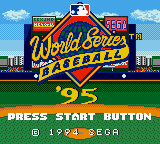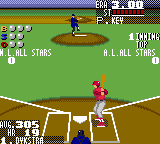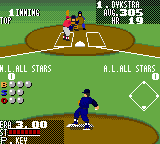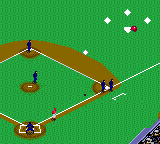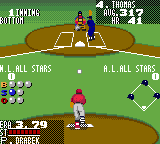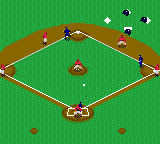- For the Sega Mega Drive version, see World Series Baseball '95 (Mega Drive).
World Series Baseball '95 is a Sega Game Gear baseball game and is part of Sega's World Series Baseball franchise. It is a localized version of Tatakae! Pro Yakyuu Twin League and the successor to World Series Baseball.
The game contains all of the players and teams from the 1994 season, though, because of the players' union strike, the season was truncated and the World Series was canceled that year.
Gameplay
The game retains the gameplay and features of the preceding entry, but it adds a new center field view for pitching and batting and updates the roster to the then latest season, including the division realignment (with each league having three divisions). Players can choose from any of the 28 teams from the 1994 MLB season, plus the American League All-Stars and National League All-Stars ("dream teams" consisting of the best players from each league) and up to two custom teams created by the player.
Before each game, players can choose a pitcher and create a batting line-up by ordering the starting members or swapping reserve players. Players can toggle auto-fielding or voice samples, select the length of the game (from 3, 5, 7, or a full 9 innings), and choose between two views (Back for a view from behind home base and Center for a view from behind the pitcher's mound). In Exhibition Mode, players additionally can toggle designated hitters and whether to play as the home or visiting team (home bats last). Finally, players have a choice between two domes and two outdoor parks.
|
|
Defense
|
When pitching, use  and and  to position the pitcher on the mound. Throw the ball with to position the pitcher on the mound. Throw the ball with  ; use ; use  and and  for a breaking ball, for a breaking ball,  to throw a change-up (slow pitch), or to throw a change-up (slow pitch), or  to throw a fastball. Faster pitches are harder for the batter to hit but more likely to travel farther or potentially result in a home run. The batter is eliminated when three strikes are thrown; the batter gets a free base if the pitcher throws four balls or hits the batter. to throw a fastball. Faster pitches are harder for the batter to hit but more likely to travel farther or potentially result in a home run. The batter is eliminated when three strikes are thrown; the batter gets a free base if the pitcher throws four balls or hits the batter.
Pitchers have a stamina gauge. Fastballs and curve balls wear out pitchers faster. When a pitcher is low on stamina, the ball becomes harder to control. The player can pause the game with START and press  to change the view or to change the view or  to substitute a relief pitcher. to substitute a relief pitcher.
When fielding, the D-Pad controls all of the fielders simultaneously (with the camera focused on the one closest to the ball). The player can have the nearest fielder jump by pressing  or dive by pressing or dive by pressing  while holding a direction. Once the ball is in possession, throw it to base by pressing while holding a direction. Once the ball is in possession, throw it to base by pressing  while holding a direction corresponding to the base ( while holding a direction corresponding to the base ( for first, for first,  for second, for second,  for third, or for third, or  for home) or press for home) or press  by itself to throw to first base. by itself to throw to first base.
If auto-fielding is enabled, the computer controls the player's outfielders automatically, but the player can take control at any point by pressing the D-Pad.
|
|
|
Offense
|
When hitting, the D-Pad positions the batter in the batter's box. Swing with  ; the batter stops the swinging motion when the button is released. Square up a bunt by holding ; the batter stops the swinging motion when the button is released. Square up a bunt by holding  + + ; the batter can be moved around while holding the bunt. The player can instruct a baserunner to lead-off by holding a direction corresponding to a base ( ; the batter can be moved around while holding the bunt. The player can instruct a baserunner to lead-off by holding a direction corresponding to a base ( for first, for first,  for second, for second,  for third, or for third, or  for home) and pressing for home) and pressing  or steal a base by holding a direction and also holding or steal a base by holding a direction and also holding  . .
The player can pause the game with START and press  to change the view or to change the view or  to substitute a pinch hitter. to substitute a pinch hitter.
|
Modes
The game has the following modes:
- Exhibition Mode: An exhibition mode, for playing a single game against the computer. The player selects a team to play as well as a team to play against (which can be the same team).
- Versus Mode: The two-player mode, allowing two players to play a game against each other over a Gear-to-Gear Cable. Player one decides the length of the game, the stadium, who bats first, and whether to allow designated hitters.
- Pennant Mode: Plays a season of 32, 84, 123, or a full 162 games against computer-controlled teams. The game cartridge stores the player's progress so it can be continued at any time.
- Team Edit: Allows the player to create up to two custom teams composed of any of the players from any of the teams in the game. The teams are stored on the cartridge and can be played in Exhibition Mode.
- Player Data: View the statistics for any of the 700 players in the game.
Teams
| League
|
Division
|
Team
|
Players
|
| American
|
Western
|
 Texas Rangers Texas Rangers
|
|
 Seattle Mariners Seattle Mariners
|
|
 California Angels California Angels
|
|
 Oakland Athletics Oakland Athletics
|
|
| Central
|
 Chicago White Sox Chicago White Sox
|
|
 Kansas City Royals Kansas City Royals
|
|
 Cleveland Indians Cleveland Indians
|
|
 Minnesota Twins Minnesota Twins
|
|
 Milwaukee Brewers Milwaukee Brewers
|
|
| Eastern
|
 Baltimore Orioles Baltimore Orioles
|
|
 Toronto Blue Jays Toronto Blue Jays
|
|
 New York Yankees New York Yankees
|
|
 Detroit Tigers Detroit Tigers
|
|
 Boston Red Sox Boston Red Sox
|
|
| National
|
Western
|
 San Francisco Giants San Francisco Giants
|
|
 Los Angeles Dodgers Los Angeles Dodgers
|
|
 Colorado Rockies Colorado Rockies
|
|
 San Diego Padres San Diego Padres
|
|
| Central
|
 Houston Astros Houston Astros
|
|
 St. Louis Cardinals St. Louis Cardinals
|
|
 Chicago Cubs Chicago Cubs
|
|
 Pittsburgh Pirates Pittsburgh Pirates
|
|
 Cincinnati Reds Cincinnati Reds
|
|
| Eastern
|
 Atlanta Braves Atlanta Braves
|
|
 Montreal Expos Montreal Expos
|
|
 Philadelphia Phillies Philadelphia Phillies
|
|
 Florida Marlins Florida Marlins
|
|
 New York Mets New York Mets
|
|
Magazine articles
- Main article: World Series Baseball '95 (Game Gear)/Magazine articles.
Promotional material
Print advert in
(US) #5: "May 1995" (1995-04-18)
also published in:
- (US) #24: "May 1995" (1995-xx-xx)[3]
- (US) #70: "May 1995" (1995-0x-xx)[4]
Physical scans
| {{{{{icon}}}|L}}
|
Division by zero.
|
Based on
0 review
|
| Sega Retro Average
|
| Publication
|
Version
|
Score
|
|
| (US)
|
NTSC-U
|
|
[5]
|
| (US)
|
NTSC-U
|
|
[6]
|
| (US)
|
NTSC-U
|
|
[7]
|
|
World Series Baseball '95 (Game Gear)
| Game Gear, US
|
|
|
 Cart  Manual |
Technical information
ROM dump status
| System |
Hash |
Size |
Build Date |
Source |
Comments |
|
|
|
| ?
|
| CRC32
|
578a8a38
|
| MD5
|
e7eabbfc7a1f1339c4720249aea92a32
|
| SHA-1
|
66d31ed6bb6dfedd769bf5e6c5dcbf899f2f2c8c
|
|
512kB
|
|
Cartridge (US)
|
128B backup
|
|
|
|
| ?
|
|
|
1994-06-29
|
|
|
|
|
Page
|
| ?
|
|
|
1994-07-09
|
|
|
|
|
Page
|
| ?
|
|
|
1994-07-19
|
|
|
|
|
Page
|
| ?
|
|
|
1994-07-22
|
|
|
|
|
Page
|
| ?
|
|
|
1994-07-28
|
|
|
|
|
Page
|
| ?
|
|
|
1994-07-29
|
|
|
|
|
Page
|
| ?
|
|
|
1994-08-02
|
|
|
|
|
Page
|
References
- ↑ https://gdri.smspower.org/wiki/index.php/I.T.L
- ↑ Sonic Times, "Volume 2 Number 9: October 1994" (US; 1994-xx-xx), page 2
- ↑ Sega Visions, "May 1995" (US; 1995-xx-xx), page 76
- ↑ Electronic Gaming Monthly, "May 1995" (US; 1995-0x-xx), page 2
- ↑ Electronic Games (1992-1995), "July 1995" (US; 1995-0x-xx), page 89
- ↑ GamePro, "November 1994" (US; 1994-xx-xx), page 194
- ↑ VideoGames, "November 1994" (US; 1994-1x-xx), page 122
